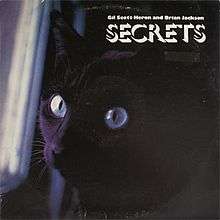Secrets (Gil Scott-Heron and Brian Jackson album)
Secrets is a 1978 studio album by American vocalist Gil Scott-Heron and keyboardist Brian Jackson.
| Secrets | ||||
|---|---|---|---|---|
 | ||||
| Studio album by | ||||
| Released | September 1978 | |||
| Recorded | April–June 1978 | |||
| Studio | Tonto, Santa Monica, California[1] | |||
| Genre | Jazz, disco, dance | |||
| Length | 37:38 | |||
| Label | Arista | |||
| Producer | Gil Scott-Heron, Brian Jackson | |||
| Gil Scott-Heron and Brian Jackson chronology | ||||
| ||||
Release and reception
| Review scores | |
|---|---|
| Source | Rating |
| Christgau's Record Guide | B+[2] |
Secrets was released in September 1978 by Arista Records[3] and debuted at number 31 on the Billboard magazine's jazz chart on September 9.[4] According to Arista executive Clive Davis, the album was Scott-Heron's first since 1975's The First Minute of a New Day to reach the top 100 of Billboard's top albums chart, while the single "Angel Dust" nearly became a hit.[5]
Reviewing for The Village Voice in 1979, Robert Christgau lamented the lack of hooks on songs such as "Third World Revolution" but appreciated "Show Bizness"'s "tribulations-of-stardom" theme and "educational refrain". His main point of praise was for Scott-Heron's political flair, writing that he "stokes the protest-music flame more generously than any son of Woody, and in sheer agitprop terms 'Angel Dust,' one of those black-radio hits that somehow never crossed over, is his triumph--haunting music of genuine political usefulness."[6] People magazine appreciated the record's jazz sounds from Jackson and the Midnight Band, while calling Secrets "another angry, robust collection of song-poems, this time exploring injustice, drug addiction and revolution".[7] Tristan Bath of The Quietus later said it departed from the jazz chords, faint keyboard, and Afrocentric themes of Scott-Heron and Jackson's previous recordings together in favor of "disco and futurist dance music tropes".[8] Colin Larkin gave the album three out of five stars in his Virgin Encyclopedia of 70s Music (2002).[9] AllMusic assigned it three-and-a-half stars on its website and three stars in the print All Music Guide to Soul, but omitted a review in both instances.[3][10]
The album track "Better Days Ahead" was later reworked and released on Scott-Heron's 2014 posthumous compilation Nothing New.[11]
Track listing
All tracks are written by Gil Scott-Heron, except where noted.
| No. | Title | Writer(s) | Length |
|---|---|---|---|
| 1. | "Angel Dust" | 4:13 | |
| 2. | "Madison Avenue" | Scott-Heron, Brenda Morocco, Brian Jackson | 3:06 |
| 3. | "Cane" | 3:31 | |
| 4. | "Third World Revolution" | Scott-Heron, Jackson | 4:22 |
| 5. | "Better Days Ahead" | 3:28 |
| No. | Title | Writer(s) | Length |
|---|---|---|---|
| 6. | "Three Miles Down" | Scott-Heron, Jackson | 4:18 |
| 7. | "Angola, Louisiana" | 5:32 | |
| 8. | "Show Bizness" | 2:48 | |
| 9. | "A Prayer For Everybody / To Be Free" | Jackson | 6:20 |
| Total length: | 37:38 | ||
Personnel
Credits are adapted from the album's liner notes.[1]
- Gil Scott-Heron – production, vocals, rhythm piano (tracks 2, 3, 6, 7, and 8)
- Brian Jackson – production, flute, piano, keyboard bass (synthesizer), TONTO synthesizer, drums (tracks 3 and 4)
- Malcolm Cecil – associate producer, production assistance, engineering, and mixing
- Lenny Peterzell – production assistance, engineering, and mixing
- Barnett "The Doctor" Williams – congas, Batá drums, assorted percussion
- Leon Williams – tenor saxophone (tracks 4 and 9)
- Harvey Mason – drums (tracks 2, 6, 7, and 8)
- Greg Phillinganes – electric piano, Polymoog synthesizer, TONTO synthesizer
- Alvin Taylor – drums (track 1)
- Ralph Penland – drums (tracks 5 and 9)
- Julia Waters – backing vocals
- Marti McCall – backing vocals
- Maxine Waters Waddell – backing vocals
- Technical
- Donn Davenport – art direction
- Trevor Brown – photography
Charts
| Chart (1978–79) | Peak position |
|---|---|
| U.S. Billboard 200[12] | 61 |
| U.S. Top Jazz Albums (Billboard)[13] | 11 |
| U.S. Top Soul Albums (Billboard)[14] | 45 |
References
- Secrets (vinyl LP liner notes). Gil Scott-Heron & Brian Jackson. Arista Records. 1978. AB 4189.CS1 maint: others (link)
- Christgau, Robert (1981). "Consumer Guide '70s: S". Christgau's Record Guide: Rock Albums of the Seventies. Ticknor & Fields. ISBN 089919026X. Retrieved March 12, 2019 – via robertchristgau.com.
- "Secrets - Brian Jackson,Gil Scott-Heron". AllMusic. Retrieved January 28, 2017.
- Anon. (September 2, 1978). "Jazz". Billboard. p. 50. Retrieved January 28, 2017.
- Davis, Clive (2013). "Gil Scott-Heron and Ghostbusters". The Soundtrack of My Life. Simon & Schuster. p. 255. ISBN 1476714797. Retrieved January 28, 2017.
- Christgau, Robert (January 29, 1979). "Consumer Guide". The Village Voice. Retrieved January 28, 2017.
- "Picks and Pans Review: Secrets". People. October 16, 1978. Retrieved January 28, 2017.
- Bath, Tristan (November 26, 2014). "Cold Comfort: Gil Scott-Heron & Brian Jackson's Winter In America". The Quietus. Retrieved December 21, 2018.
- Larkin, Colin (2002). "Gil Scott-Heron". The Virgin Encyclopedia of 70s Music (3rd ed.). Virgin Books. p. 389. ISBN 1852279478.
- Bogdanov, Vladimir; Bush, John; Woodstra, Chris; Erlewine, Stephen Thomas, eds. (2003). "Gil Scott-Heron". All Music Guide to Soul: The Definitive Guide to R&B and Soul. Hal Leonard Corporation. p. 604. ISBN 0879307447.
- Carroll, Jim (April 17, 2015). "Gil Scott-Heron: Nothing New". The Irish Times. Retrieved January 28, 2017.
- "Gil Scott-Heron - Chart history". Billboard. Retrieved January 28, 2017.
- Anon. (September 23, 1978). "Jazz". p. 62. Retrieved January 28, 2017. Cite magazine requires
|magazine=(help) - Anon. (February 17, 1979). "Billboard Soul LPs". Billboard. p. 59. Retrieved January 28, 2017.